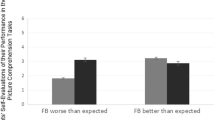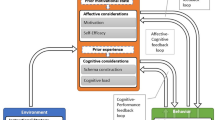Abstract
The effects of self-instructional and external instructional training procedures on the performance of mentally retarded adults in a sheltered workshop situation were compared. In addition, the influence of several subject variables (general verbal and performance abilities, and specific linguistic and memory skills) on task behavior was examined. Forty-four workers were trained to perform a complex sorting task. During training, which utilized modeling, feedback, and social praise procedures, instructional control was gradually transferred to clients in both intervention conditions. Results indicated that positive changes in performance of self-instructionally trained individuals was not found to be significantly better than that of externally instructed individuals. The hypothesis that self-instruction would be more effective with subjects who were linguistically deficient was not supported. The results suggest that ceding of instructional control, not self-verbalization, may be the critical factor producing performance improvement in self-instructional training programs. Analyses of the relationships between subject ability characteristics and task behavior suggest that performance abilities were more important than verbal abilities in producing effective task performance. The implications of the results for future research are discussed.
Similar content being viewed by others
References
Bankson, N. W. (1977).Bankson language screening test. Austin: Pro-Ed.
Beaudichon, J. (1975). Nature and instrumental function of private speech in problem solving situations.Merril-Palmer Quarterly, 19 117–135.
Bem, S. (1967). Verbal self control: The establishment of effective self-instruction.Journal of Experimental Child Psychology, 74 485–491.
Borkowski, J., & Varnhagen (1984). Transfer of learning strategies: Contrast of self-instructional and traditional training formats with EMR children.American Journal of Mental Deficiency, 88 369–379.
Bornstein, P. H., & Quevillon, R. P. (1976). The effects of a self-instructional package on overactive preschool boys.Journal of Applied Behavior Analysis, 9 179–188.
Braswell, L., Kendall, P. C., Braith, J., Carey, M. P., & Vye, C. S. (1985). “Involvement” in cognitive behavioral therapy with children: Process and its relationship to outcome.Cognitive Therapy and Reseach, 9 611–630.
Burgio, L. S., Whitman, T. L., & Johnson, M. (1980). A self-instructional package for increasing attending behavior in educably mentally retarded children.Journal of Applied Behavior Analysis, 13 433–459.
Camp, B. W., Blom, G. E., Herbert, F., & van Doorninck, W. J. (1977). “Think aloud”: A program for development of self-control in young aggressive boys.Journal of Abnormal Child Psychology, 5 157–169.
Cohen, J. (1960). A coefficient of agreement for nominal scales.Educational and Psychological Measurement, 20 37–46.
Cohen, J. (1968). Weighted kappa: Nominal scale agreement with provision for scaled disagreement or partial credit.Psychological Bulletin, 70 213–220.
Copeland, A. P. (1981). The relevance of subject variables in cognitive self-instructional programs for impulsive children.Behavior Therapy, 12 520–528.
Copeland, A. P., Rineer, E. M., & Jirkovsky, A. M. (1984). Examining a premise underlying self-instructional techniques.Cognitive Therapy and Research, 8 619–629.
Denney, N. W., & Turner, M. C. (1979). Facilitating cognitive performance—children: A comparison of strategy versus modeling with overt self verbalization.Journal of Experimental Child Psychology, 25 119–131.
Evangelisti, D., Whitman, T., & Maxwell, S. E. (1987). A comparison of external and self-instructional formats with children of different ages and tasks of varying complexity.Cognitive Therapy and Research, 11 419–436.
Frauenglass, M. H., & Diaz, R. M. (1985). Self-regulatory functions of children's private speech: A critical analysis of recent challenges to Vygotsky's theory.Developmental Psychology, 21 357–364.
Greenfield, P. M. (1984). A theory of the teacher in the learning activities of everyday life. In B. Rogoff & J. Lave (Eds.),Everyday cognition: Its development in social context (pp. 117–138). Cambridge, MA: Harvard University Press.
Guralnik, M. (1976). Solving complex discrimination problems: Techniques for the development of problem solving strategies.American Journal of Mental Deficiency, 81 18–25.
Johnston, M. B., & Whitman, T. L. (1987). Self-instructional training and children's math solving: A study of training, maintenance, and generalization.Cognition Therapy and Research, 11 335–348.
Johnston, M. B., Whitman, T. L., & Johnson, M. (1980). Teaching addition and substraction to mentally retarded children: A self-instructional program.Applied Research in Mental Retardation, 1 141–160.
Kendall, P. C., & Wilcox, L. E. (1980). Cognitive-behavioral treatment for impulsivity: Concrete versus conceptual training in non-self-controlled problem children.Journal of Consulting and Clinical Psychology, 48 60–90.
Keogh, D., Faw, G. D., Whitman, T. L., & Reid, D. H. (1984). Enhancing leisure skills in severely retarded adolescents through a self-instructional treatment package.Analysis and Intervention in Developmental Disabilities, 4 333–351.
Keogh, D., Whitman, T. L., & Maxwell, S. E., (1988). Self-instruction versus external instruction: Individual differences and training effectiveness.Cognitive Therapy and Research, 12 591–610.
Kohlberg, L., Yeager, J., & Hjertholm, E. (1968). Private speech: Four studies and a review of theories.Child Development, 39 691–736.
Martin, J. E., Decker, P. J., & Trtol, K. A. (1982). The use of picture cues to establish self control in the preparation of complex meals by mentally retarded adults.Applied Research in Mental Retardation, 3 105–119.
Maxwell, S. E., Delaney, H. D., & Dill, C. A. (1984). Another look at ANCOVA versus blocking.Psychological Bulletin, 95 136–147.
Meacham, J. A. (1978). Verbal guidance through remembering the goals of action.Child Development, 49 188–193.
Meichenbaum, D., & Goodman, J. (1971). Training impulsive children to talk to themselves: A means of developing self control.Journal of Abnormal Psychology, 77 115–126.
Parrish, J. M., & Erickson, M. T. (1981). A comparison of cognitive strategies in modifying the cognitive style of impulsive third-graders.Cognitive Therapy and Research, 5 71–84.
Peters, R., & Davies, K. (1981). Effect of self-instructional training on cognitive impulsivity of mentally retarded adolescents.American Journal of Mental Deficiency, 85 377–382.
Robin, A., Armel, S., & O'Leary, D. (1975). The effects of self-instruction on writing deficiency.Behavior Therapy, 6 178–187.
Rogoff, B., & Gardner, W. (1984). Adult guidance of cognitive development. In B. Rogoff & J. Lave (Eds.),Everyday cognition: Its development in social context (pp. 95–116). Cambridge, MA: Harvard University Press.
Rusch, F. R., Morgan, T. K., Martin, J. E., Rivas, M., & Agran, M. (1985). Teaching mentally retarded employees self-instructional strategies.Applied Research in Mental Retardation, 6 384–407.
Schleser, R. S., Cohen, R., Meyers, A. W., & Rodick, J. D. (1984). Effects of cognitive level and training procedures on the generalization of self-instructions.
Schleser, R. S., Meyers, A. W., & Cohen, R. (1981). Generalization of self-instruction: Effects of general versus specific content, active rehearsal and cognitive level.Child Development, 52 335–340.
Sowers, J., Verdi, M., Bourbeau, P., & Sheehan, M. (1985). Teaching job independence and flexibility to mentally retarded students through the use of a self control package.Journal of Applied Behavior Analysis, 18 81–85.
Wacker, D. P., & Berg, W. K. (1983). Effects of picture prompts on the acquisition of complex vocational tasks by mentally retarded adolescents.Journal of Applied Behavior Analysis, 16 417–433.
Wacker, D. P., & Greenebaum, F. T. (1984). Efficacy of a verbal training sequence on the sorting performance of moderately and severely mentally adolescents.American Journal of Mental Deficiency, 88 653–660.
Wertsch, J. V. (1979). From social interaction to higher psychological processes: A clarification of Vygotsky's theory.Human Development, 22 1–22.
Whitman, T. L. (1987). Self-instruction, individual differences, and mental retardation.American Journal of Mental Deficiency, 92 213–223.
Whitman, T. L., & Johnston, M. B. (1983). Teaching addition and substraction with regrouping to educable mentally retarded children: A group self-instructional package.Behavior Therapy, 14 127–143.
Whitman, T. L., Spence, B. H., & Maxwell, S. E. (1987). A comparison of external and self-instructional teaching formats with mentally retarded adults in a vocational training setting.Research in Developmental Disabilities, 8 371–388.
Author information
Authors and Affiliations
Additional information
This research was supported in part by a training grant from the National Institutes of Health (NIH-1260-17848). The authors would like to thank Scott Maxwell and Andy Johnson for their statistical advice and technical assistance. The cooperation of the workers and staff at Adec Industries, and especially David Janzen, is also greatly appreciated.
Rights and permissions
About this article
Cite this article
Spence, B.H., Whitman, T.L. Instruction and self-regulation in mentally retarded adults in a vocational setting. Cogn Ther Res 14, 431–445 (1990). https://doi.org/10.1007/BF01172937
Issue Date:
DOI: https://doi.org/10.1007/BF01172937




